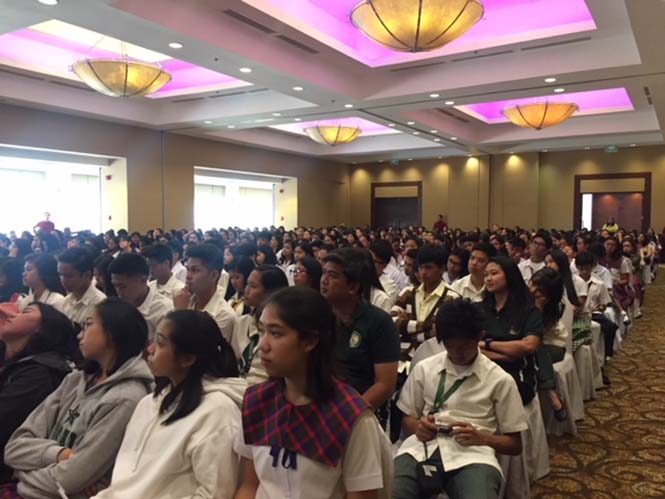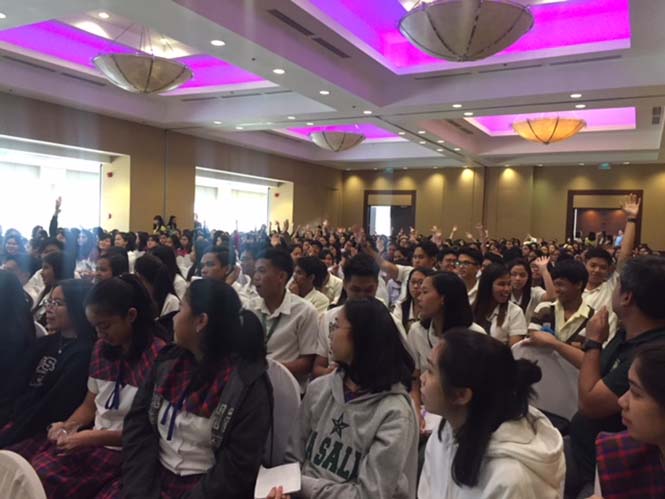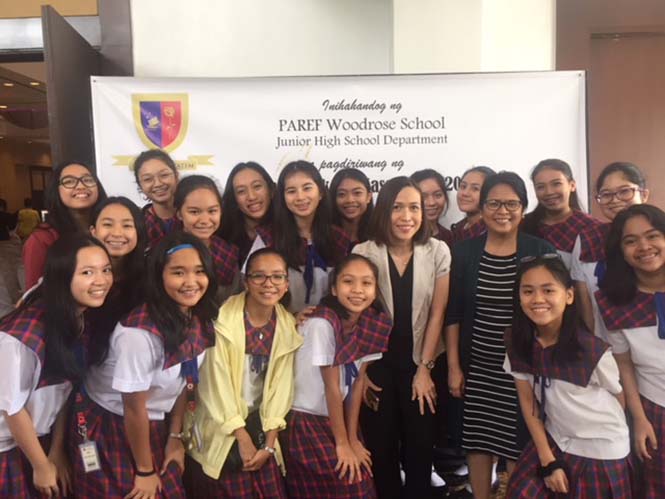By Sabine Alexa Guinto
On August 24, 2018, Woodrose students attended a History Symposium at the Palms Country Club. The event was organized by the History Department of the Junior High School which extended the invitation to public school students from CALABARZON. Following several recent controversies of national importance, such as the burial of Marcos in the Libingan ng mga Bayani, the aim of the symposium is to inform the youth about the importance of knowing one’s history and the current issues surrounding it.
The first speaker, Professor Mary Dorothy Jose, is an assistant professor at the Department of Social Sciences, University of the Philippines Manila. She is a recipient of the Gawad Likasyan para sa Pagpapalaganap ng Kasaysayan in 2013, UP Manila-PGH Gender Advocate Award in 2013 and 2014, ENITAS (Empowering Network for International Thai and ASEAN Studies) research grant from the Institute of Thai Studies, Chulalongkorn University in 2016, and University Library Fellowship by the Center for Southeast Asian Studies at the University of Michigan in 2018. She has also co-authored several social studies and social sciences textbooks.
The second speaker, Professor Luz Rimban, is the Executive Director of the Konrad Adenauer Asian Center for Journalism, a unit under the Communication Department of the Ateneo de Manila University, where she teaches journalism at the undergraduate and M.A. levels. She has been named to the Hall of Fame of the Jaime V. Ongpin Awards for Excellence in Journalism and is a recipient of the Ninoy Aquino Award in Journalism and the Marshall McLuhan Fellowship. She also co-founded the online news site VERA Files.
In the first part of the symposium, Professor Jose discussed five different commonly held concepts of historical contention in her talk entitled Debunking and Demythifying Historical Issues. She touched on misconceptions still taught in some schools about the origins of Filipinos, debunking the Waves of Migration theory created by Henry Otley Beyer. Aside from this, she debunked the ideas of Prinsesa Urduja hailing from a kingdom in Pangasinan and the Code of Kalantiaw being a legitimate written document. She also clarified whether the first mass was truly held in Limasawa, Leyte or in Butuan and if Lapu Lapu truly killed Magellan.
Professor Jose also touched on the Filipino word kasaysayan and its etymology.
Kasaysayan. This is the Filipinos’ precious indigenous concept of history. Coming from the Filipino root word saysay, this term indicates making sense of something important. And kasaysayan, or history is one of the most important things to uncover and analyze. History is the sum of all human experiences. Aside from being a looking glass into the past and its many lessons, it is also the basis of the Filipino identity. Filipino history is a rich tapestry woven by past ancestors, who then pass the loom on to the present generations. History is a fragile treasure, which lives through the stories of predecessors and lives in all individuals, pulsing constantly like a beating heart. As the heart of the Filipino identity, the one thing that unifies all despite their differences, Philippine national history must be preserved and protected so we don’t forget about who we are and where we came from.
Professor Rimban built upon this idea of preserving and protecting national history in her talk about righting and rewriting Philippine history. She placed this concept in the current context with the rising outbreak in fake news and falsehoods circulating mass media. She talked about several types of information disorder such as misinformation, unintentional mistakes publicized on media, disinformation, fabricated or manipulated audio or visual content, and malinformation, the deliberate publication of falsehoods to either maliciously push an agenda or mislead people. From this, she continued by informing the listeners about social media responsibility, which is avoiding posting or sharing fake news and reporting them to prevent falsehoods from being spread because it is through this that one’s view on the past is altered. As digital citizens, she urged the students to use social media carefully, with discernment.
This is where the youth comes in. As those who have participated in the symposium and as digital citizens in a rapidly evolving digital age, they have an important duty to their nation to prevent and reverse the damage done to Philippine history. They must use their learnings to pave a path towards complete historical awareness.
History truly is the heart of the Filipino identity. All must rise up as a nation to keep it pulsing with life.





